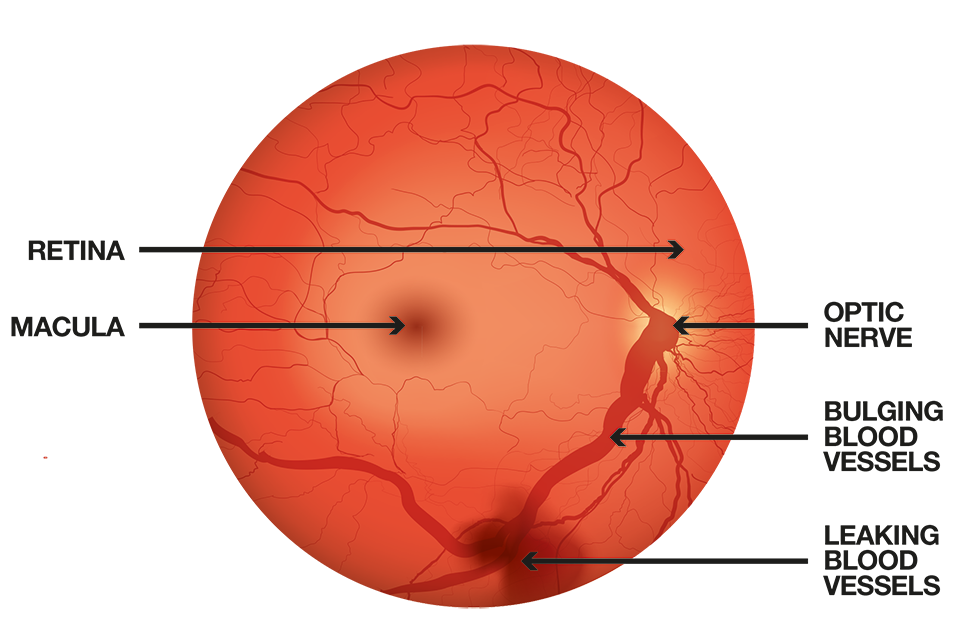Closer monitoring and treatment of diabetic retinopathy
Updated 23 June 2025
Applies to England
1. Overview
This information is for people who have been referred from diabetic eye screening because they need:
- closer monitoring in a surveillance clinic
- referral for further investigation or treatment
Diabetic retinopathy progresses with time. If you want more information on how it can progress:
- visit NHS.UK
- see the separate leaflet Your guide to diabetic retinopathy
You may want to discuss this information with your health care team.
2. Closer monitoring in a surveillance clinic

A digital photograph of a retina showing signs of damage from diabetic retinopathy
We need to monitor your eyes more closely in a surveillance clinic if you:
- have signs of diabetic retinopathy that has progressed but does not yet require treatment (pre-proliferative retinopathy)
- have previously had successful treatment for sight-threatening retinopathy
- have diabetic maculopathy that does not yet require treatment
- are pregnant – as pregnancy increases the risk of rapid progression of diabetic retinopathy
Closer monitoring in a surveillance clinic can be offered every 3, 6, 9 or 12 months depending on the type and progression of the changes to your eyes.
If images of your retina show signs of improvement, you may return to routine annual screening.
If images of your retina confirm signs of serious changes, you may be referred to a hospital eye services clinic for further investigation or treatment.
3. Referral and treatment
If your diabetic eye screening test shows signs of sight-threatening diabetic retinopathy we need to refer you to a hospital eye services clinic for further tests and possible treatment.
This means you may be at risk of long-term problems with your sight because your diabetes is affecting the small blood vessels in your retina.
An eye specialist, called an ophthalmologist, will examine your eyes. They will make a diagnosis and explain any possible treatments that could help you.
You will remain under the care of the hospital until being discharged back into the care of the diabetic eye screening programme.
4. Possible treatments
4.1 Laser treatment (photocoagulation):
Laser treatment:
- is the most common treatment for proliferative diabetic retinopathy and is most effective when the condition is detected early
- aims to stabilise changes in your eyes caused by diabetes and prevent further sight loss
- may involve more than one visit to the laser clinic before changes are controlled
- involves focusing an intense beam of light on to the retina in small spots
- can substantially reduce the risk of severe sight loss in people who have proliferative diabetic retinopathy or maculopathy
4.2 VEG F inhibitors
Injections of vascular endothelial growth factor (VEG F) inhibitor drugs can reduce the risk of sight loss in some patients diagnosed with diabetic macular oedema. This is a condition that occurs when diabetes causes fluid to build up on or under the macula – the central part of the retina that you use to see things clearly.
VEG F inhibitors can help to reduce the build-up of fluid in macular oedema.
5. Preparing for surveillance or hospital appointment
You should:
- bring your current glasses (spectacles) with you
- bring a list of any medication you are taking
- not drive for up to 4 to 6 hours after your appointment as you may be given eye drops that can blur vision
- bring sunglasses with you to wear home, as your eyes may be sensitive to bright light after your appointment
6. How you can help
You should:
- continue to attend your appointments
- keep your blood sugar (HbA1c) at the levels agreed with your health care team
- see your health care team regularly to check that your blood pressure is not raised
- keep your blood fats (cholesterol) at the levels agreed with your health care team
- get professional advice if you notice any new problems with your sight
- eat a healthy, balanced diet
- lose excess weight if you are overweight
- take your medication as prescribed
- exercise regularly
- cut down or stop smoking if you are a smoker
Remember, you should continue to visit an optician regularly for a normal eye examination as well as attending your diabetic eye screening appointment.
7. More information
You can find more information at:
The NHS screening programmes use personal information from your NHS records to invite you for screening at the right time. NHS England also uses your information to ensure you receive high quality care and to improve the screening programmes. Find out more about how your information is used and protected, and your options.
Find out how to opt out of screening.
